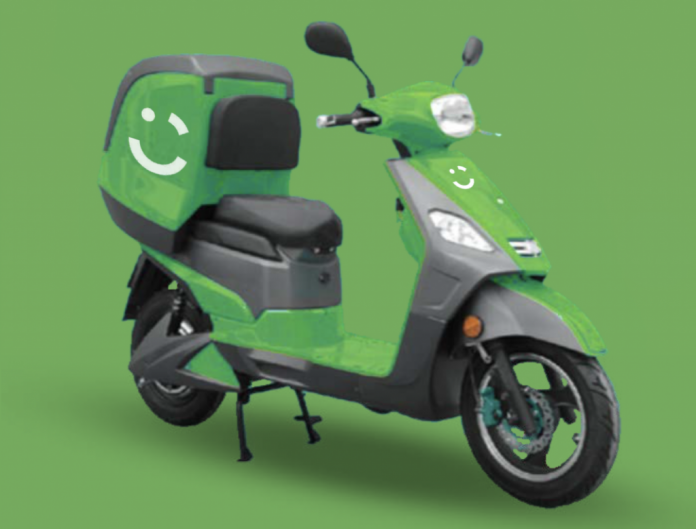Dubai: To promote public health and safety, delivery riders are now required to secure an occupational work permit from the Roads and Transport Authority, a top official from the RTA confirmed to Gulf News.
In an interview, Abdullah Ibrahim Al Meer, director of Commercial Transport Activities at RTA’s Licensing Agency, said the occupational permit is included in the comprehensive set of guidelines for delivery services, covering the type of transport or motorcycle, size of delivery boxes, tariff and area of delivery, medical and police clearance, as well as training of riders and their required uniforms.
Al Meer explained there is a difference between having a motorcycle licence for leisure or personal needs and acquiring one for commercial or work purposes. He also noted: “Given the continuous growth of delivery services in Dubai and the extensive reliance of residents on these services, it has become imperative to regulate the industry and bring it in line with the world’s top practices, especially regarding security and safety.
“The objective of these regulations is to ensure compliance with the highest safety and quality standards, to reduce traffic accidents, and to protect both the consumers and delivery riders.”
Here are the set of guidelines being implemented by the RTA:
Occupational work permit
Al Meer said all delivery riders must undergo occupational health and safety training given by the RTA, after securing a motorcycle licence. “Having a driving licence does not mean you can work as a delivery rider,” noted Al Meer, adding: “During the training, the RTA will teach the riders the occupational risks, safety, health and welfare. We will teach them how to deal with customers, how to carry the goods, maintain good hygiene and how to drive in tight areas.”
The objectives of the training are to promote riders’ health and working capacity, ensuring a safe working environment and public health. These will not only enhance productivity but will also ensure road safety, according to Al Meer.
Standard tariff and scope of delivery
Companies or service providers must register their business and riders with the RTA to ensure that regulations and tariff are followed.
A fixed tariff or standard delivery charge will be imposed by the RTA. Al Meer said this will put an end to varying costs charged by delivery companies. This will also ensure cost of products and services will not be inflated.
The RTA will also implement a safe travel distance, meaning delivery riders are not allowed to go beyond their sector or radius of delivery. Al Meer explained: “For example, a delivery rider is assigned to deliver within Jumeirah, he will not be allowed to deliver to Deira or Al Nahda. He can only deliver within a specified sector or area.”
According to Al Meer, food, medicine and other pharmacy products should be delivered within a 20-kilometre radius; while equipment, documents, electronics or any dry goods, are allowed to be delivered within a 25km boundary. “We want to ensure that the food is still hot when it reaches the door of the customer. We also want to avoid multiple deliveries, where riders have to go to different areas and rush on the road, and not being mindful of road safety,” he noted.
The RTA has a monitoring system to regulate the tariff, check the distance and appraise the type of goods being delivered. If these are not followed, booking a delivery will not be successful. Big News: Al Shindagha Tunnel in Dubai closed again this weekend
Safety gear
The RTA will also implement a standard uniform for riders. “Delivery companies are required to provide the uniform for their riders, depending on the weather. When it’s winter, the rider must be protected against the cool weather and when it’s summer, the material should also be conducive for extreme hot weather. The uniform must provide protection to the riders. They must also wear reflectorised vests and standard helmets,” Al Meer explained.
Motorcycle and delivery box
As per RTA specifications, the engine of the delivery bike should be 150CC (cubic capacity) and above to ensure it has enough power to carry the rider and his load on the highway. The cargo or goods, meanwhile, should not exceed 20kg.
Al Meer said delivery bags at the back of riders are no longer allowed. A delivery box must be fixed on the motorcycle and the RTA has coordinated with Dubai Municipality and Dubai Health Authority in determining the size and design of the delivery box. “It must be hygienic and must be able to retain the required temperature of the goods or food,” he added.
Al Meer said all riders will have a standard delivery box with barcode. “The box should not block the side mirrors. We will have a standard size and colour. We will show the design and exact specifications of the delivery box soon,” he added. The motorcycle will also have a fixed panel to put the mobile or smartphone of the rider.
Rider database
The RTA will keep a rider database. The work permit is renewed every year. Like for taxi drivers, delivery riders are also required to undergo a medical test annually. A police clearance is also required to get a delivery work permit.
Al Meer explained: “We want to ensure public health and safety that’s why we are now implementing annual medical check-up for our riders. We also want to ensure that they have no criminal records or are working illegally.”
Road safety app
The RTA is also enforcing strict monitoring of riders on the road. “We have a system to monitor sudden swerving and each delivery bike has a barcode so we can monitor which bike are parked illegally,” Al Meer noted. The RTA also has an app to monitor that the rider operates only within his defined area. No passenger is also allowed to sit on the pillion or behind the delivery rider.
Consumer education
Al Meer noted the reforms and string of guidelines were developed after conducting a series of consultations with all stakeholders in the delivery business sector. The measures are not only for the riders but also for the consumers.
He said the RTA will also launch a campaign to educate the public on how to treat the riders respectfully. “They [riders] have done a great job — like frontliners. They served us [consumers] by delivering our needs when we stayed at home during the height of the pandemic.”
“We will launch a social media campaign on how to treat riders properly. It’s as easy as giving them a bottle of water or not making them wait for a long time while doing a delivery,” Al Meer added.
Welcome development
Thomas Edelmann
Thomas Edelmann, founder and managing director of RoadSafetyUAE, has praised the RTA’s initiative. He told Gulf News: “The RTA has set another great example in further regulating the booming motorcycle delivery industry to the benefit of all road users and the delivery customers.”
Edelmann noted the motorcycle deliver ecosystem is a complex one, with different interests from the aggregator brands that provide customers front-end services and the fleet operators that actually own and run the delivery motorbikes.
“The RTA has considered the input of stakeholders to come up with an effective and feasible set of regulations and proper enforcement methodology. It’s not just a blend of equipment specifications (bike type, protective gear and delivery boxes, backpacks) but also content regulating the safe conduct of delivery riders,” he added.
Edelmann supports the requirement for commercial riders to have a special licence or work permit other than the motorcycle licence. “The riders’ commercial safe driving skills needs to be taught and monitored regularly, ideally by means of tracking technology, just like we all know it from taxis for example,” he added.
White-point system
“This so-called telematics functionality either via on-board computer or mobile app is readily available and it would be a game changer instantly. Rider performance can be easily tracked and potential dangerous behaviour can be swiftly detected and improved. Such a system can also be the basis of a white point system that will reward the safest delivery riders,” Edelmann explained.
Edelmann also agreed on educating other road users on how to interact safely with delivery riders. He noted: “Via consumer promotions the delivery customers need to be educated of being concerned about the safety and well-being of delivery riders. From our research we know riders think to a big extent — about 50 per cent — that customers are just interested in ‘on-time delivery’ rather than their safety.” Indian Railways, IRCTC: These special trains going to run rail, know routes and time table
“Certainly, delivery customers do actually care. We believe that this misperception is fuelling a lot of rider misbehaviour and this needs to be addressed, in addition to the technical aspects of regulating such a vital segment,” he added.




